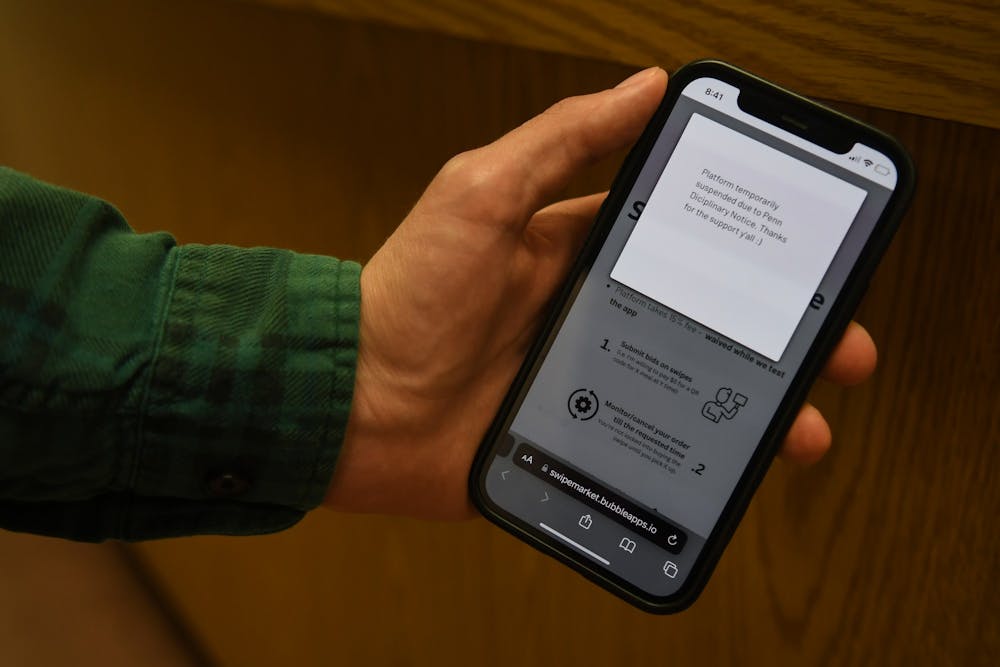
On April 12, a Wharton junior launched a meal swipe exchange platform. Eight days later, he received a disciplinary notice from the University.
The platform, Swipe Exchange, allowed students to list and bid on meal exchanges at the retail dining location Houston Market. Its functionality was based on how users can use Penn Eats to scan QR codes to pick up food purchased with a meal swipe. This allowed Swipe Exchange to put students into contact with one another once a seller accepted a bid.
On April 20, Swipe Exchange's founder, Wharton junior Arham Habib, received a disciplinary notice from Penn’s Center for Community Standards and Accountability. The notice, which was obtained by The Daily Pennsylvanian, said that Habib's platform was "in violation of Penn's meal plan policies" and instructed Habib to immediately disable the platform or face possible disciplinary action.
A spokesperson for University Life wrote that they cannot comment on judicial processes due to privacy concerns. According to Swipe Exchange's website, its operations are now “temporarily suspended.”
CSA's notice to Habib stated that he needed to schedule a meeting with a CSA case manager to “clarify the specifics of the incident and review the possible options for resolving the matter" — otherwise, his academic records could be placed on disciplinary hold. The notice also stated that Habib has not yet been charged with a policy violation and that the matter “may or may not lead to disciplinary action.”
Habib told the DP that the policy of forbidding student exchanges of dining swipes is “egregious and unfair.”
“On principle, it doesn’t make sense for you to not be allowed to sell something you own," Habib said. "The dining plan is already overpriced relative to options around campus, and it’s economically unfair to force students onto it and not let them sell or offer swipes to friends."
The recent rise in meal swipe exchanges has in part caused Penn Dining to tighten its policy that students use only their own PennCards, which has sparked pushback among students.
According to Habib, he had envisioned a virtual swipe trading platform since Penn first enforced mandatory dining plans for sophomores, believing it would help to “reduce some of the wasted swipes.” He materialized this idea after his gap year, when he said he became a better developer after working for a startup.
“I realized that if you use screen recordings instead of screenshots, you could actually exchange meal swipes without being in person,” Habib said.
The platform worked by allowing for bidding between buyer and seller. According to Habib, setting a fixed price at $6.00 did not appeal to many users, as people could visit Penn’s food trucks as an alternative, so he decided to create a bidding system. Based on the cost of student meal plans, a meal swipe averages to $17.00.
“For example, if you want a meal for $4.00, you can put a $4.00 bid into the platform, and then you see if there's any seller that matches with you," Habib said before the platform was suspended. "I think it's a more intelligent approach, and I'm curious about what people end up deciding the fair value of a swipe is."
Habib said that he thinks Penn’s policy of only allowing students to use meal swipes for themselves is inefficient and creates more food waste.
“The policy contributes to waste by forcing pre-made food to go to waste. It’s pathetic that Penn is standing in the way of efficient, economically inclusive, and student-led initiatives,” Habib added.
The Daily Pennsylvanian is an independent, student-run newspaper. Please consider making a donation to support the coverage that shapes the University. Your generosity ensures a future of strong journalism at Penn.
Donate







